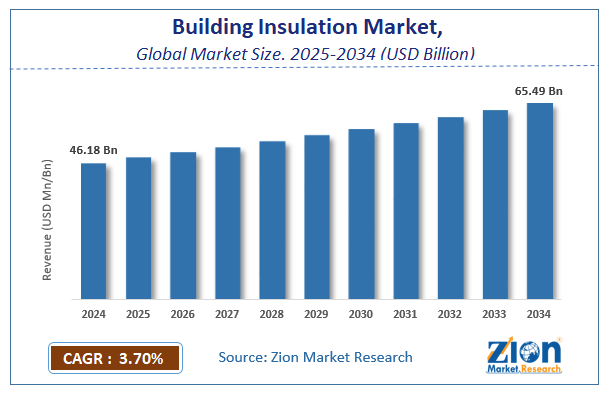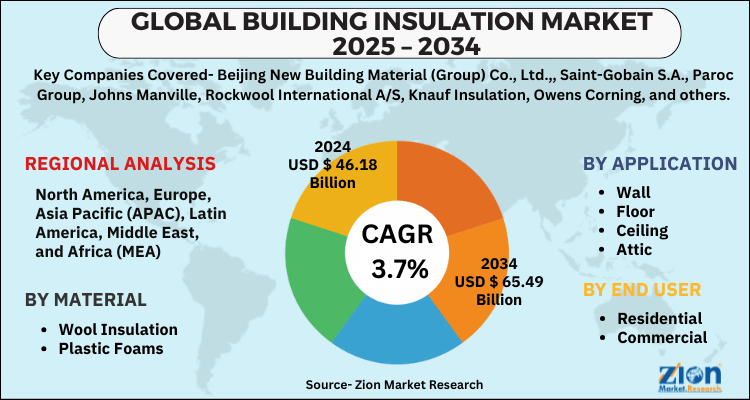Building Insulation Market Size, Share, Trends, Growth 2034

Building Insulation Market By Material (Wool Insulation and Plastic Foams); By Application (Wall, Floor, Ceiling, and Attic); By End User (Residential and Commercial) and By Region - Global and Regional Industry Overview, Market Intelligence, Comprehensive Analysis, Historical Data, and Forecasts 2025 - 2034
| Market Size in 2024 | Market Forecast in 2034 | CAGR (in %) | Base Year |
|---|---|---|---|
| USD 46.18 Billion | USD 65.49 Billion | 3.7% | 2024 |
Building Insulation Market: Industry Perspective
The global building insulation market was valued at USD 46.18 Billion in 2024 and is anticipated to surpass USD 65.49 Billion by 2034, with a compound annual rate of 3.7% between 2025 and 2034. The report comprehensively analyses growth factors, opportunities, and challenges in the market during the forecast period. Additionally, the report explores the investor and stakeholder space to help turn opportunities into profitable business factors.
Building Insulation Market: Overview
A steady and consistent growth rate of the global building insulation market in the past few years is likely to be determined by a healthy CAGR in the forthcoming years. Building insulation refers to the installation of thermal resistance in construction properties with the aim to lower heat, thereby saving cooling expenses by enhancing the energy efficiency of the air conditioners to prevent heat loss. Insulation adopts R-value to measure the thermal resistance that indicates the heat holding capacity of the material used in them. In general, the thicker the insulation layer, the higher the R-value will be. Building insulation encourages temperature control of surface and energy conservation with minimal charges.
Building insulation is the process of reducing heat transfer between adjacent environments and maintaining an ambient temperature indoors. These insulated buildings help reduce the carbon footprint as it utilizes less energy in order to maintain a temperature and limits the conduction of heat to the external environment. Thermally insulated homes or buildings are less affected by external environmental temperature. Thermal insulation in buildings can be done using various materials such as foamed plastic, fiber glass, and mineral wool among various others such as cotton slag, wool slag, aerogels etc. Foamed plastic insulation materials include expanded polystyrene, extruded polystyrene, polyurethane and other forms of plastic.
Key Insights
- As per the analysis shared by our research analyst, the global building insulation market is estimated to grow annually at a CAGR of around 3.7% over the forecast period (2025-2034).
- Regarding revenue, the global building insulation market size was valued at around USD 46.18 Billion in 2024 and is projected to reach USD 65.49 Billion by 2034.
- The building insulation market is projected to grow at a significant rate due to growing construction and infrastructure development, increasing energy efficiency regulations, rising demand for sustainable and eco-friendly insulation materials, and advancements in thermal and acoustic insulation technologies.
- Based on Material, the Wool Insulation segment is expected to lead the global market.
- On the basis of Application, the Wall segment is growing at a high rate and will continue to dominate the global market.
- Based on the End User, the Residential segment is projected to swipe the largest market share.
- Based on region, North America is predicted to dominate the global market during the forecast period.
Building Insulation Market: Report Scope
| Report Attributes | Report Details |
|---|---|
| Report Name | Building Insulation Market |
| Market Size in 2024 | USD 46.18 Billion |
| Market Forecast in 2034 | USD 65.49 Billion |
| Growth Rate | CAGR of 3.7% |
| Number of Pages | 167 |
| Key Companies Covered | Beijing New Building Material (Group) Co., Ltd.,, Saint-Gobain S.A., Paroc Group, Johns Manville, Rockwool International A/S, Knauf Insulation, Owens Corning, and others. |
| Segments Covered | By Material, By Application, By End User, and By Region |
| Regions Covered | North America, Europe, Asia Pacific (APAC), Latin America, The Middle East and Africa (MEA) |
| Base Year | 2024 |
| Historical Year | 2020 to 2023 |
| Forecast Year | 2025 - 2034 |
| Customization Scope | Avail customized purchase options to meet your exact research needs. Request For Customization |
Building Insulation Market: Growth Drivers
Increasing energy expenditure will pave the way for global market growth.
High energy cost is one of the primary reasons for the growing demand for building thermal insulation products, particularly in commercial and residential applications. The cost incurred due to the unaccountable consumption of energy is twofold. Heavy energy usage leads to a steep surge in prices and causes fast depletion of natural resources. Commercial and residential spaces are looking forward to insulating their places and premises. Manufacturers of thermal insulation materials are concentrating on enhancing the overall performance of the material. Therefore, the application materials are innovated in a way to lower the overall installation and assembly time owing to the reduced thickness of insulating materials and several other factors. Thin application materials offer enormous benefits in material handling and thereby increase the load-bearing capacity of the established structures. Thereby, it supports architects and designers in designing an efficient building framework and structure.
Building Insulation Market: Restraints
Growing threats of substitutes may hamper the global market growth.
Growing preference for recyclable, biodegradable, and green products by businesses, architects, and homeowners due to the growing environmental awareness is likely to foster the threat of substitutes in the market.
The major factor which is driving the growth of the building insulation market is stringent energy efficiency regulations for buildings are driving the penetration of insulation in the overall building stock and also increasing the amount of insulation needed per building. The emerging trends such as the shift towards greener insulation alternatives and increasing demand for high-temperature thermal insulation are having a direct impact on the dynamics of the building insulation industry. However, lack of awareness about energy saving and slow growth of construction industry is hindering the growth of building insulation market. Nonetheless, building insulation market will be expected to spur demand due to growth of construction sector in economically emerging countries such as China, Brazil, India, Netherlands, and others
Building Insulation Market: Opportunities
Favorable regulations focusing on reducing overall energy consumption are likely to offer huge growth opportunities.
Thermal insulation helps lower the dependency on air conditioning and ventilation, thereby significantly minimizing energy consumption globally. Additionally, the favorable building codes in Canada and the US, along with the growth of energy certification agencies like the US Green Building Council (USGBC) and leadership in Energy & Environmental Design (LEED), are likely to positively impact the growth trajectory of the global building insulation market by offering ample growth opportunities.
Building Insulation Market: Challenges
The high initial investment is a common barrier in the global market.
The lack of proper financing options for the up-front investments and high initial costs is continued to be a huge challenge for market players. However, the government in several regions has taken appropriate initiatives to lower the barriers like financial incentives, mandatory energy efficiency standards, etc.
Building Insulation Market: Segmentation Analysis
The global building insulation market is segmented based on Material, Application, End User, and region.
Based on Material, the global building insulation market is divided into Wool Insulation and Plastic Foams.
On the basis of Application, the global building insulation market is bifurcated into Wall, Floor, Ceiling, and Attic.
By End User, the global building insulation market is split into Residential and Commercial.
Recent Developments
- Hira Industries, in February 2021, launched Aero foam NBR Lap Seal Tubes. These are effective and efficient thermal insulation solutions installed in commercial and residential complexes to offer enhanced durability, safety, and efficiency of the buildings.
- Demilec Inc., in September 2019, launched several spray foam insulation products for the Middle East market.
Building Insulation Market: Regional Landscape
Europe accounts for the largest share in the global building insulation market due to the growing regulations by the regional government regarding encouraging thermal insulation for energy conservation. Additionally, the growing construction activities in the commercial and residential sectors in North America are likely to foster speedy growth in the regional market. Additionally, the growing awareness among people regarding energy conservation materials is further likely to propel the growth of the regional market significantly during the forecast period.
Building Insulation Market: Competitive Landscape
The report provides a company market share analysis to give a broader overview of the key market players. In addition, the report also covers key strategic developments of the market, including acquisitions & mergers, new product launches, agreements, partnerships, collaborations & joint ventures, research & development, and regional expansion of major participants involved in the building insulation market on a global and regional basis.
Some of the significant players in the global building insulation market include
- Beijing New Building Material (Group) Co., Ltd.,
- Saint-Gobain S.A.
- Paroc Group
- Johns Manville
- Rockwool International A/S
- Knauf Insulation
- Owens Corning
The global building insulation market is segmented as follows:
By Material
- Wool Insulation
- Plastic Foams
By Application
- Wall
- Floor
- Ceiling
- Attic
By End User
- Residential
- Commercial
By Region
- North America
- The U.S.
- Canada
- Mexico
- Europe
- France
- The UK
- Spain
- Germany
- Italy
- Rest of Europe
- Asia Pacific
- China
- Japan
- India
- Australia
- South Korea
- Rest of Asia Pacific
- The Middle East & Africa
- Saudi Arabia
- UAE
- Egypt
- Kuwait
- South Africa
- Rest of the Middle East & Africa
- Latin America
- Brazil
- Argentina
- Rest of Latin America
Table Of Content
Methodology
FrequentlyAsked Questions
The global building insulation market is expected to grow due to increasing energy efficiency regulations, rising awareness of sustainable building practices, and growing construction activities worldwide.
According to a study, the global building insulation market size was worth around USD 46.18 Billion in 2024 and is expected to reach USD 65.49 Billion by 2034.
The global building insulation market is expected to grow at a CAGR of 3.7% during the forecast period.
North America is expected to dominate the building insulation market over the forecast period.
Leading players in the global building insulation market include Beijing New Building Material (Group) Co., Ltd.,, Saint-Gobain S.A., Paroc Group, Johns Manville, Rockwool International A/S, Knauf Insulation, Owens Corning, among others.
The report explores crucial aspects of the building insulation market, including a detailed discussion of existing growth factors and restraints, while also examining future growth opportunities and challenges that impact the market.
RelatedNews
HappyClients
Zion Market Research
Tel: +1 (302) 444-0166
USA/Canada Toll Free No.+1 (855) 465-4651
3rd Floor,
Mrunal Paradise, Opp Maharaja Hotel,
Pimple Gurav, Pune 411061,
Maharashtra, India
Phone No +91 7768 006 007, +91 7768 006 008
US OFFICE NO +1 (302) 444-0166
US/CAN TOLL FREE +1 (855) 465-4651
Email: sales@zionmarketresearch.com
We have secured system to process your transaction.
Our support available to help you 24 hours a day, five days a week.
Monday - Friday: 9AM - 6PM
Saturday - Sunday: Closed






